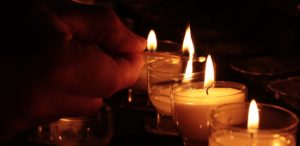Proverbs 3:24
“When you lie down, you will not be afraid; when you lie down, your sleep will be sweet.”
There’s a reason fear seems to plague us most at night. Actually there are a lot of reasons. We’re tired at the end of the day and strong emotions are harder to deal with when we’re tired. We slow down at night and have fewer distractions, so events and conversations that we didn’t have time to process throughout the day can all come flooding to our minds at the same time. Something about the darkness itself feeds fears of the unknown with its hidden spaces and long shadows.
When we sleep, we are at our most vulnerable. For the most part, we are unaware of our surroundings and unable to care for ourselves. Sleeping deeply can leave us feeling sluggish and disoriented when we first wake up. Letting go of consciousness for the hours that we sleep is something we do so regularly that we don’t usually reflect on what an act of surrender and trust it really is.
But a night of sweet sleep makes everything feel better in the morning, doesn’t it? It can restore us in both mind and body, blessing us with renewed energy, fresh perspective, and new ideas to solve problems. Sleep is a gift of peace and rest.
It’s as if we spend all day trying to keep the world spinning. We have our to-do lists and everyday chores, and I spend many days feeling like I’m trying to race the clock to the finish line. If I’m honest, I spend much of that time with an exaggerated sense of my own importance in making sure Earth continues to rotate on its axis. Of course I have responsibilities that I need to take seriously, but I’m the type of person that often risks taking myself and my role a little too seriously.
Then, when it is time to sleep, we symbolically hand over the reins to God and say, “Here, take care of things for me for a few hours while I get some rest. It should be pretty quiet for you tonight.”
God is not the babysitter of the universe, watching things for us when we need a break. He lets us hold the reins together with him, and help steer the horse, but he doesn’t need us to do that in order to stay on the road. If we’re willing to trust him to be in control while we’re sleeping, why aren’t we more willing to trust that he is also in control while we’re awake?
This verse in Proverbs is part of a list of the benefits of wisdom and understanding, sound judgment and discretion. Wisdom and understanding remind me who is in control, sound judgment leads me to choose my attitude and actions in light of this reality, and discretion reminds me that I am free to rest in God’s care. Waking or sleeping, God is constant. “He who watches over you will not slumber.” (Psalm 121:3)

So we can sleep peacefully each night, but also live at peace each day while we’re awake.
“I am one in whom Christ delights and dwells. I live in the strong and unshakeable Kingdom of God. The Kingdom is not in trouble, and neither am I.” – James Bryan Smith
Moment of Beauty
This song speaks of being confident enough in God’s love for us that we are free to let go and stop trying to control everything. May its words be a prayer for you today.
“Control” by Tenth Avenue North






